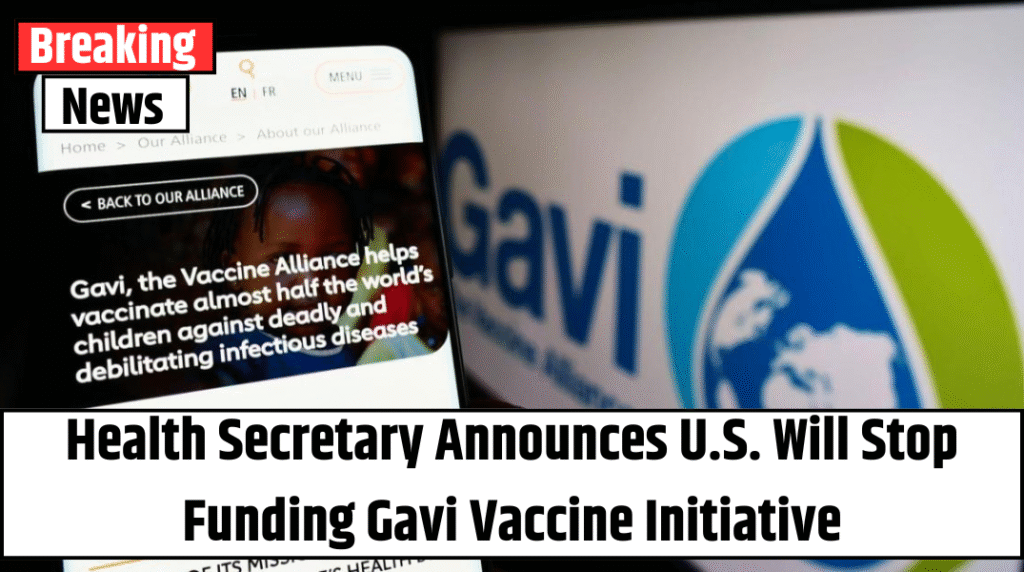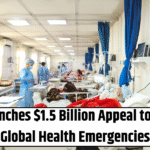In a move drawing widespread attention and criticism from public health advocates, U.S. Health and Human Services Secretary Robert F. Kennedy Jr. announced that the United States will halt its financial contributions to Gavi, a global health organization that has facilitated the vaccination of over one billion of the world’s poorest children since its inception.
Kennedy made the announcement in a video message aired at a Gavi fundraising summit held in Brussels. In his statement, he challenged Gavi’s credibility, citing what he called “questionable recommendations” surrounding COVID-19 vaccines and raising concerns about the DTPw (diphtheria-tetanus-whole cell pertussis) vaccine. However, he did not present scientific evidence to support those concerns.
“I call on Gavi today to re-earn the public trust and justify the $8 billion that America has provided since 2001,” Kennedy said, adding, “Until that happens, the United States won’t contribute more.”
This marks a sharp policy pivot, continuing the trajectory initiated under former President Donald Trump’s administration, which previously indicated a desire to scale back foreign aid, including Gavi’s annual $300 million share from the U.S.
Gavi Responds: “Safety Is Our Top Priority”
Gavi responded swiftly, reaffirming its commitment to global health and scientific rigor. In a public statement, the organization emphasized that it operates under the guidance of the World Health Organization (WHO) and noted that the DTPw vaccine has played a key role in reducing child mortality by half in countries it supports since 2000.
“The DTPw vaccine has been administered to millions worldwide and is credited with saving more than 40 million lives over the past five decades,” Gavi stated.
Pushback from Public Health Groups
Kennedy’s remarks sparked backlash from public health advocates, who accused him of spreading misinformation. Public Citizen, a nonprofit advocacy group, rejected Kennedy’s claims, stating:
“Gavi’s vaccine recommendations are grounded in rigorous scientific evidence and peer-reviewed by independent experts. Claims that it ignores science are completely unfounded and dangerously misleading.”
Critics argue that Kennedy’s skepticism has already contributed to rising vaccine hesitancy in the U.S., and warn that halting support for global immunization efforts could have deadly consequences in vulnerable populations.
Also Read – Health Care AI Meant to Save Costs Now Relies on High-Priced Human Labor
Reshaping Vaccine Policy at Home
Since assuming office in February, Kennedy—a long-time vaccine skeptic—has made dramatic changes to how vaccines are managed domestically. Earlier this month, he dismissed all 17 members of the CDC’s Advisory Committee on Immunization Practices (ACIP), a panel established more than 60 years ago to provide science-based vaccine guidance.
Kennedy replaced them with eight new members, several of whom have a track record of opposing standard immunization practices. In a statement on social media, Kennedy said the new committee members are committed to “demanding definitive safety and efficacy data before making any vaccine recommendations.”
Their first meeting was held this week under close scrutiny from both the medical community and the public.
Conflicting Messages on COVID-19 Vaccines
The restructured ACIP convened as CDC scientists released materials reaffirming that vaccination remains the best protection for pregnant women and children. Data also showed that most pediatric COVID-19 hospitalizations involved unvaccinated children.
However, Kennedy has already announced that under his leadership, COVID-19 vaccines will no longer be recommended for healthy children or pregnant women, creating confusion and concern within the healthcare system. His panel has yet to vote on whether they support this revised stance.
Amid this tension, Dr. Michael Ross, one of Kennedy’s new appointees to the committee, resigned just before the meeting began, reducing the panel to seven members. The Trump administration cited a standard review of financial disclosures as the reason for his withdrawal.
Vaccine Guidance Split
In a striking development, the American Academy of Pediatrics (AAP) announced it would now publish its own childhood vaccine guidelines independently of the ACIP, citing the current process as “no longer credible.” Traditionally, ACIP’s recommendations influence both public policy and private insurance coverage decisions. But with no current director at the CDC, those decisions now rest with Kennedy—who has already delayed acting on recommendations made by the previous committee in April.
Also Read – Health Care AI Falls Short on Savings, Relies Heavily on Human Labor
Looking Ahead: Senate Confirms New CDC Leadership
Meanwhile, Senate confirmation hearings have begun for Susan Monarez, President Trump’s nominee to lead the CDC. During the hearings, she affirmed her support for vaccine science and stated that she would review the decision to withdraw funding from Gavi.
“Global health preparedness is essential for our national security and well-being,” Monarez said. “We must continue supporting evidence-based vaccine programs.”
A Defining Moment for U.S. Vaccine Policy
Kennedy’s reshaping of vaccine strategy, both globally and domestically, is already altering the U.S. public health landscape. While his supporters praise him for challenging the status quo, many scientists, clinicians, and global health experts fear the erosion of decades of progress in vaccine access and public trust.
With the future of U.S. contributions to global immunization programs in limbo, and increasing divergence between traditional public health institutions and new federal leadership, the debate over vaccine science is likely to intensify in the months ahead.



